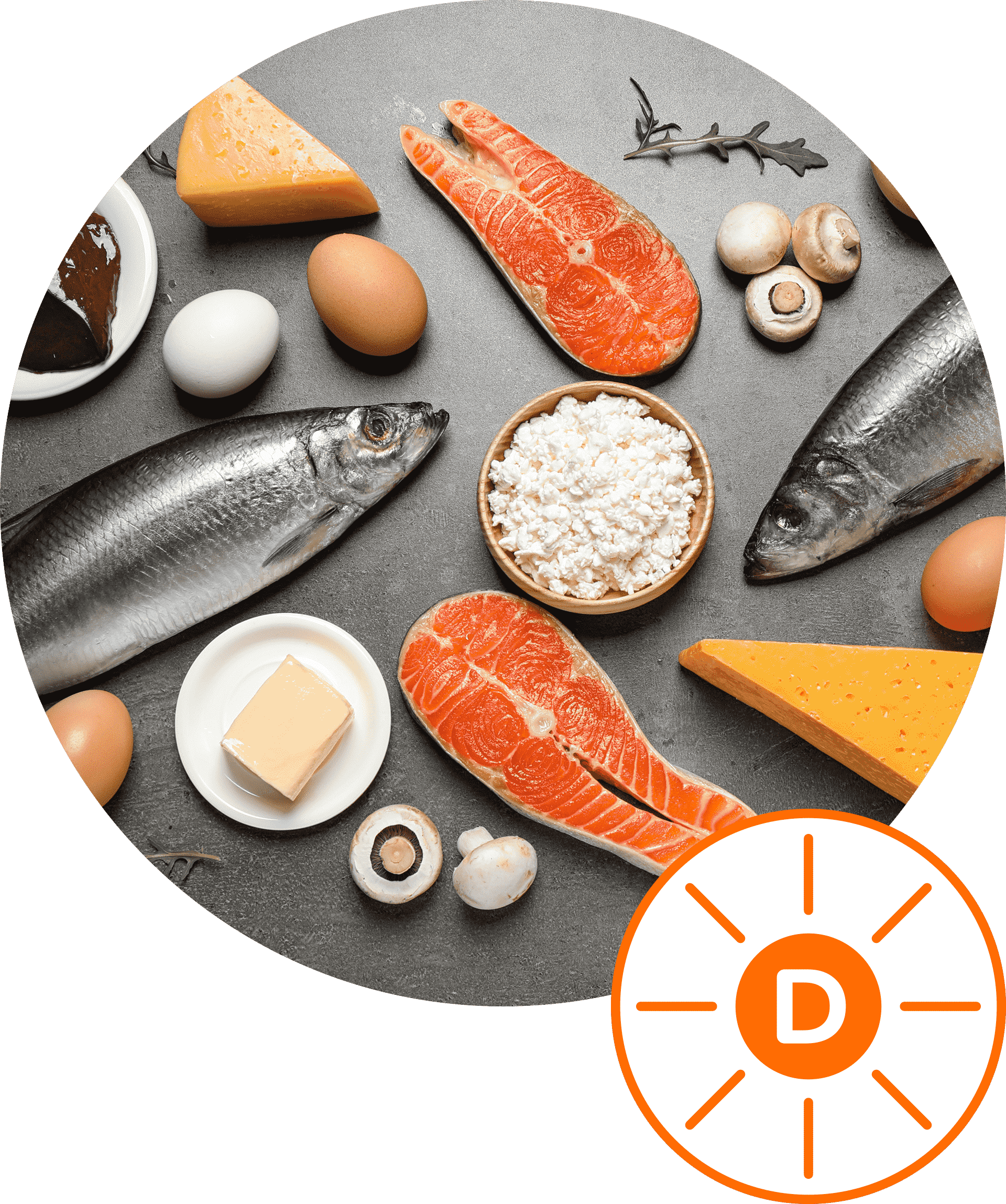
Where is the immune system located?
The immune system is spread throughout the entire body, and the digestive system plays a huge role in it.
READ MOREThe information on this part of the website is intended only for health care professionals. I am an expert within the meaning of Act No. country xy. I herewith confirm that I am a professional according to this definition.
Unfortunately, as you are not a health care professional we cannot provide you this information.
Unlike other vitamins, the body can produce vitamin D itself. For this reason, it doesn’t act like most vitamins in our bodies, but instead more like a hormone – a messenger substance that regulates essential physiological processes.
Between 10 and 20 percent of our vitamin D required daily intake is covered by diet. However, natural sources of vitamin D in foods are limited. The highest concentrations are found in oily fish such as salmon, herring, or mackerel. Liver, egg yolk, and some mushrooms also contain vitamin D. An effective way for the body to top up on vitamin D is through sun exposure. Here, the body can synthesise vitamin D from UVB rays, which gives it the nickname “the sunshine vitamin”. Luckily, long sunbathing sessions aren’t required, regularly spending shorter periods of time outdoors during the summer with hands, face, and arms or legs uncovered and exposed to the sun is sufficient to get enough vitamin D (sunburns have to be avoided).

Did you know: In late autumn, winter and start of spring the sun is too weak that in a moderate climate a sufficient dose of vitamin D can be produced. Other factors that influence Vit D production: clothes, BMI, age, latitude, sun screen, skin colour, diet and genes.

Vitamin D is certainly not a miracle cure for all ailments, but it is a substance that the human body needs for many different physiological processes.
Vitamin D receptors (VDR) can be found in almost all of the body’s cells. While this all-rounder is known for building and maintaining strong bones and muscles, it also contributes to normal absorption/utilisation of calcium and phosphorus. It is essential for the division of cells and contributes to a normal functioning immune system.

The recommended vitamin D intake varies from babies to seniors. In the first year of life, vitamin D is essential for the normal growth and development of bones, teeth, and the immune system. As such, parents must ensure their baby receives sufficient vitamin D.
The essential role it plays continues throughout childhood and into adulthood as it helps to maintain bones and teeth and promote normal immune function. This becomes even more important for women during pregnancy as in support of their immune system and the proper growth and development of the child’s bones.


As we move into older age, many of our bodily processes begin to slow, affecting our production of vitamin D too. Getting adequate vitamin D and calcium as part of a well-balanced diet, as well as physical activity is crucial.
Vitamin D helps to reduce the risk of falling associated with postural instability and muscle weakness. Falling is a risk factor for bone fractures among men and women 60 years of age and older. It also supports the normal function of the immune system. During the winter months, supplementing vitamin D, e.g. with BioGaia Protectis chewable tablets + Vit. D3, can be helpful for those who live in a moderate climate.
| Small children (7 – 11 months)* | 10 micrograms / day |
| Children and adults (1 – 70 years)** | 15 micrograms / day |
| Adults 19 – 70 years of age* | 15 micrograms / day |
| Pregnant women* | 15 micrograms / day |
| People over 70 years of age* | 20 micrograms / day |

Our digestive tract plays an essential role in our body’s defence system, with around 80% of our immune cells located in the gut.
As such, it’s a good idea to keep it happy and filled with valuable microflora and add vitamin D to the diet, as a way of supporting normal immune system function for both you and your family. Spending time outside with moderate sun exposure, exercising, eating healthy, getting enough sleep, and reducing stress can all support the gut and the immune system. The well-researched probiotic strain Limosilactobacillus reuteri Protectis can help maintain an adequate concentration of the natural gut microflora. Combined to make a dream team, the two ingredients Limosilactobacillus reuteri Protectis and vitamin D support overall well-being and immune system.

The immune system is spread throughout the entire body, and the digestive system plays a huge role in it.
READ MORE
Our immune system is one of the most complex systems in our body and is specialised in defence. It can be divided into two cooperating defence mechanisms, which are linked together in various ways.
READ MORE
The gut plays a crucial role in immune system function. So, the first years of life are particularly important as a child’s body builds up its immunity.
READ MORE